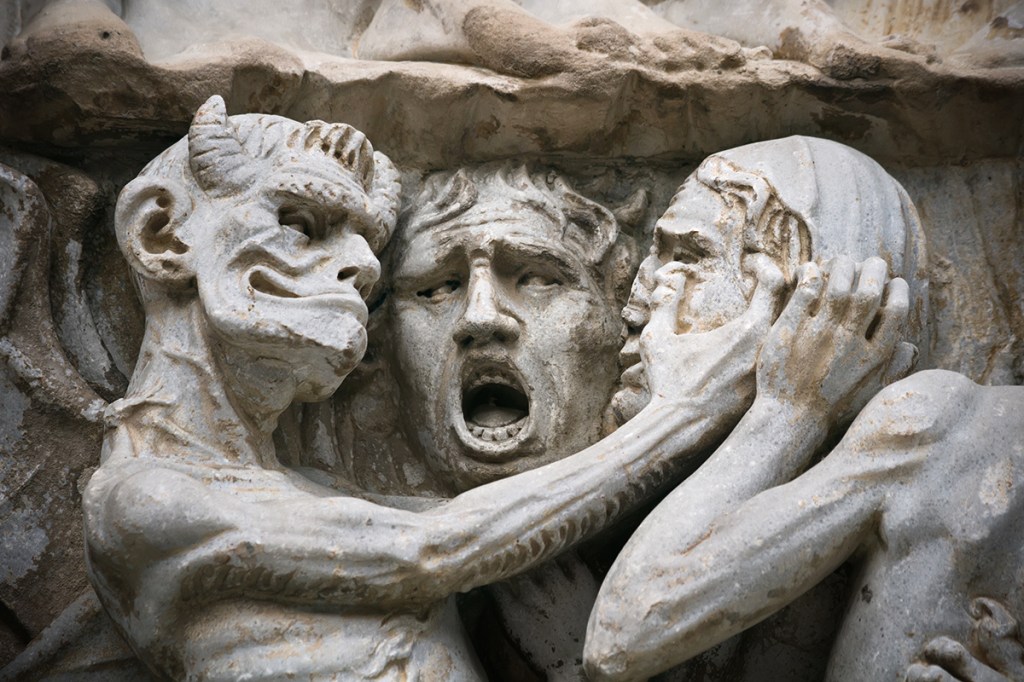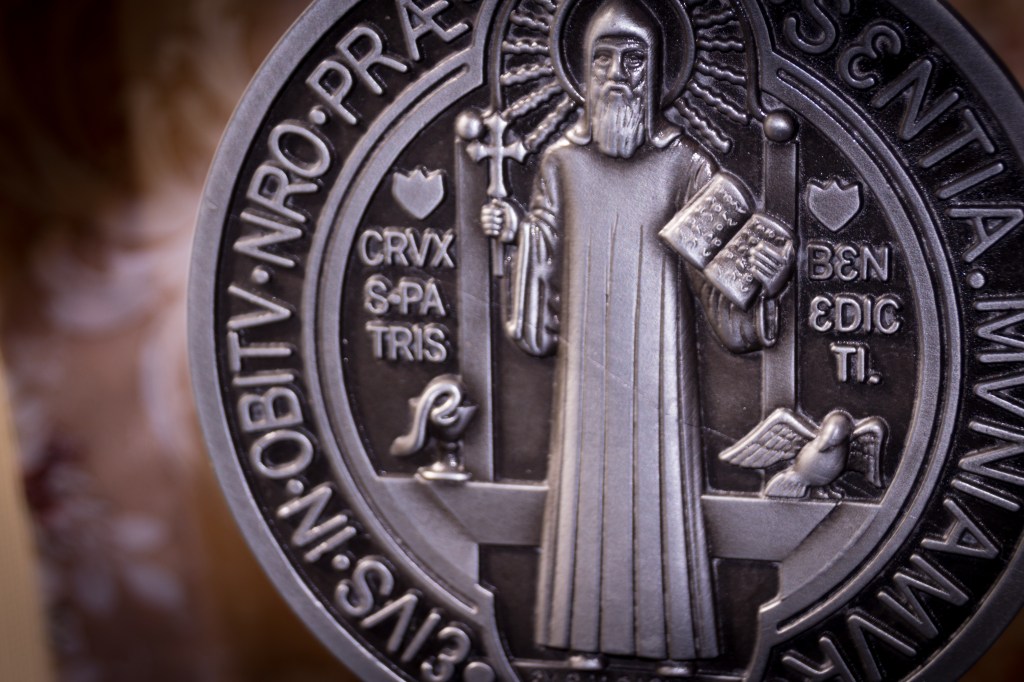The theme of “spiritual warfare” runs through Sacred Scripture, and is also part of the teaching of Tradition and the Magisterium. As the Catechism of the Catholic Church states:
“Baptism, by imparting the life of Christ’s grace, erases original sin and turns a man back towards God, but the consequences for nature, weakened and inclined to evil, persist in man and summon him to spiritual battle.” (CCC, 405, emphasis ours)
3 Enemies to fight
Simply defined, “spiritual combat” is a fight against evil, with a view to attaining holiness in this world and living here below and in the hereafter in a state of beatitude with God. This battle is waged against “bitter enemies,” in the words of Fr. Lorenzo Scupoli, author of the famous 16th-century work “Spiritual Combat,” which was a classic of Christian literature for several centuries.
These enemies are three in number: Satan, the angel who opposed God and still wants to drag all men into suffering and hell; the world (in the sense of a reality organized in a way hostile to God); and finally, “the flesh.”
To fully understand the meaning of this third enemy, we need to distinguish it from the “body” and see in it, in the words of Fr. Pascal Ide, “our wounded and sinful fragility, or our ‘shadow.’”

The lot of all the saints
The goal of spiritual warfare is spiritual growth in love, a livelier charity, and a deeper union with God. All the saints have fought and won this battle, including, for example, St. Thérèse of Lisieux. Some people might mistakenly think that the teacher of “the little way of spiritual childhood” might have been spared such battles. And yet, in Story of a Soul, she recounts how she fought a daily battle against her self-love. She offered small sacrifices and penances that were invisible to others but which cost her dearly.
Poetically, she said that through all her tiny struggles, she was “throwing flowers” to Jesus, her only love, and in return obtaining from him the conversion of sinners.
A warrior mentality
These days, if we had spiritual warfare coaches, they’d first tell us to develop a warrior mentality! To be a good warrior, we need to have the right discernment. We need to ask the Holy Spirit to shed light in our hearts so that we can better discern our evil inclinations from our good ones (and transform the latter into good daily habits). Before fighting against our neighbor’s sins, let’s first fight against our own, with humility. Fighting while arrogantly believing we are better than others would have the effect of distancing us from God.
We must also be careful not to choose the wrong adversary. We are not fighting against people, not even against ourselves, but against evil spirits and our own sin (Ephesians 6:12). This implies believing in the existence of the devil (who seeks to divide us) and being aware of his action seeking “the ruin of souls,” as Pope Leo XIII teaches us in his prayer to St. Michael the Archangel, and Pope Francis often reminds us.

Fr. Lorenzo Scupoli reminds us of the Evil One’s strategy: to blind us so that we don’t recognize our sinful state; to accustom us to our evil inclinations; and to make us fall regularly into the same sin and even greater ones by multiplying dangerous opportunities in relation to whatever are our greatest weaknesses.
War on egoism
Next, we must declare continual war on our egoism. One small way of doing this is to give others priority: This could be something as trivial as being the last to help ourselves to a slice of dessert, or the last to give our opinion.
Fr. Scupoli gives us an original piece of advice: In his view, it’s best to concentrate on just one virtue to acquire at a time. “It only takes one virtue firmly anchored in our heart to soon attract all the others.” From then on, we must seize every opportunity to practice this virtue during the day, without being surprised by the adversities that are bound to come our way.
For example, if we have a tendency to gossip, we can ask God first thing in the morning for the strength to resist the temptation to gossip during the day. We can decide that we will voluntarily speak well of someone before nightfall. All these efforts enable us to develop the opposite virtue to gossiping, which is speaking well of others, and doing good to them too.

A final key to developing a warrior mentality is to accept the daily struggle, to act with determination and perseverance. It takes a strong will, courage and perseverance. In short, engaging in spiritual warfare presupposes the will to do so.
Prayer is our first tool
The first tool in spiritual warfare is prayer, to stay united with God. The Catechism of the Catholic Church itself presents it as a battle: “Against ourselves and against the wiles of the tempter who does all he can to turn man away from prayer, away from union with God” (CCC, 2725).
A short prayer suggested by Fr. Scupoli when we are fighting spiritually against evil is, “O my Creator and my Redeemer, deliver me from my enemies, in honor of your Passion and your ineffable goodness.”

We can also pray the Our Father (during which we ask God to “deliver us from evil”), invoke the names of Jesus and Mary, pray to our guardian angel or the saints — the Archangel Saint Michael in particular — or the Virgin Mary (with this prayer endorsed by Saint Pius X, especially dedicated to spiritual combat).
Meditating on the Lord’s life and passion through the rosary is also a powerful tool for warding off sin and the evils of our lives, as well as wars and other catastrophes.
Sacred Scripture
One method used by Jesus himself consists of quoting a passage of Scripture verbatim in response to a temptation that comes our way (Mt, 4:1-11). For example, if we are frequently tempted by impurity, we can memorize the following verse and say it with all our heart when temptation arises: “God did not call us to impurity, but in holiness” (1 Thess 4:7).
Fasting
Total fasting, or fasting on bread and water, is another powerful tool when combined with prayer. However, Fr. Scupoli sees bodily asceticism as secondary to practices he considers even more essential: patience in trial, readiness to return good for evil, and mortifications of self-love.
Sacraments and sacramentals
The Sacraments of reconciliation and the Eucharist, and secondarily the use of sacramentals (blessed objects such as the Carmelite scapular, the Miraculous and St. Benedict medals, and holy water, etc.) are also indispensable. We then fight our “enemies” in the company of Jesus Christ Himself.

If we can’t enjoy sacramental Communion every day, Fr. Scupoli invites us to at least practice spiritual communion. Here’s a simple formula:
My Jesus, I believe that You are present in the Most Holy Sacrament. I love You above all things, and I desire to receive You into my soul. Since I cannot at this moment receive You sacramentally, come at least spiritually into my heart. I embrace You as if You were already there and unite myself wholly to You. Never permit me to be separated from You. Amen.
Examination of conscience
At the end of the day, an examination of conscience is a recommended tool for keeping evil out of our lives. It’s a straightforward exercise: We take a few moments to take stock of how God has worked in our lives that day, the graces and invitations he has given, etc. We also look at the faults we have committed during the day and observe the context in which we have fallen. We then ask God for forgiveness, telling him of our strong desire not to offend him again and to acquire the opposite virtue to the evil we have committed.
By accepting the daily struggle against evil, we reaffirm our desire for union with God, our commitment to Jesus Christ our King, and our renunciation of Satan. The result is profound joy — not the superficial joy of the world, but the joy of the Virgin Mary, who, crushing Satan’s head, sings her Magnificat forever!





